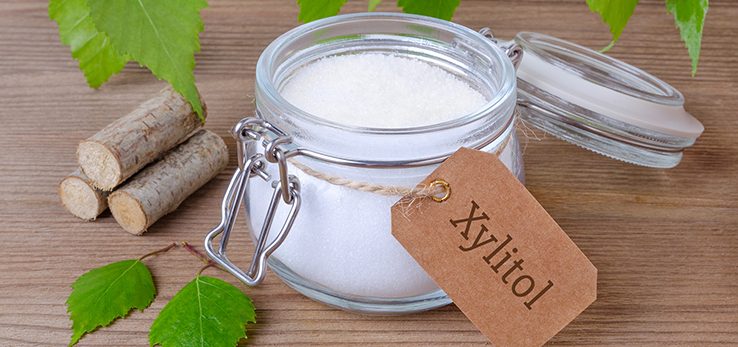Xylitol: anti-cavity properties of birch sugar
Consumption of sugar, especially white and refined sugar, significantly contributes to the development of caries. This disease, caused by a poor diet, occurs particularly often in the youngest patients who love to eat sweets. Switching to healthier types of sugar, such as xylitol (birch sugar), may help prevent this.
How sugar contributes to caries
Dental plaque contains acid-producing bacteria that attack the tooth enamel and damage the gums. Sugar is an excellent nutrient for them. Without proper diet and treatment, this damage can become permanent. When dental plaque accumulates and is not removed, it may mineralise, which preserves discolouration and transforms it into tartar. It is the main cause of oral health problems and leads to the formation of carious cavities. After a while, the carious lesions in the enamel become irreversible.
Treating caries
Development of caries can be stopped at an early stage and the layer of lost minerals can be restored through remineralisation. In the more advanced stage of the disease, mechanical treatment will be necessary. It involves drilling and filling the cavities.
Untreated caries lead to painful tooth pulpitis, which can transfer to the surrounding jaw bone and cause serious inflammation. To rescue the tooth, the dentist performs a root canal, sometimes together with antibiotic treatment, and if that does not help, he may have to extract the tooth.
How to protect teeth from caries?
The risk of developing caries is significantly reduced by:
- following a proper diet (low-sugar),
- brushing your teeth at least twice a day,
- using dental floss,
- tooth fluoridation
Xylitol instead of sugar
Xylitol exhibits very good anti-caries properties. It is a natural sweetener obtained from birch juice. It resembles sugar in appearance and taste. Bacteria inside the mouth feed on the glucose from the food we eat, but they cannot feed on xylitol. By replacing sugar with xylitol we stop feeding harmful bacteria.
How does xylitol work inside the oral cavity
Xylitol is a sugar alcohol composed of five carbon atoms. Unlike sugars, it is not metabolised by most bacteria. Therefore, it cannot be turned into acids that are harmful to the teeth. Moreover, it prevents cariogenic bacteria from producing extracellular polysaccharides that they use to adhere to the tooth surface.
Birch sugar has a positive effect on raising the pH and maintaining an acid-base balance in the oral cavity. It inhibits the action of the amylase enzyme, which breaks down carbohydrates into simple sugars inside the mouth. The alkaline environment is not beneficial for the development of cariogenic bacteria, which prefer an acidic climate.
Xylitol not only protects against the harmful effects of bacteria, but also strengthens the enamel and its remineralisation. It has a positive effect on the secretion of saliva, which naturally cleanses teeth. It is good to chew gums or hard candies containing xylitol after each meal to enjoy a beautiful and healthy smile.
Xylitol – calories and intake
Birch sugar has a low glycaemic index, which is why it is safe for diabetics. It contains 40% fewer calories than traditional sugar. One teaspoon of xylitol (6 grams) is approximately 14 kcal.
Do not exceed the daily dose of 20g of xylitol for an adult, because it may cause digestive problems such as diarrhoea and abdominal pain.
